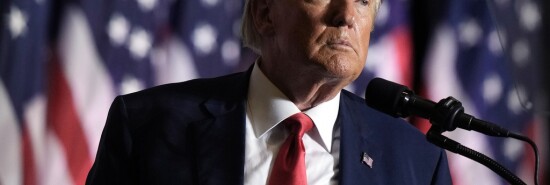
What if just one Republican challenged Trump in the primaries?
Ron Faucheux
Video Embed
Former President Donald Trump‘s Republican primary opponents at some point may need to unite in favor of the nuclear option: Get out of the race and throw their support behind one candidate against the former president.
Trump is strongest against a splintered, multicandidate primary field — the way he won in 2016. But against just one opponent, the former president could be in trouble, especially if Republican voters ultimately decide his personal baggage is too heavy for them to carry.
TYRANNY OF THE MAJORITY, OR THE MINORITY OF ONE
For now, polls show Trump crushes his GOP rivals. The indictments haven’t hurt him with his base. While his lead over second-place Gov. Ron DeSantis (R-FL) remains huge — the average of six national polls show Trump drubbing the Florida governor by 32 percentage points — Trump beats the field, that is, all his challengers combined, by a narrower 12-point spread (53% to 41%).
Clearing the field in favor of one Trump challenger would be difficult to do, some would say impossible. There is no single Republican power broker, no former president or congressional leader, with the influence to make it happen.
But there are other party power centers that could help do it. The top 50 Republican donors and fundraisers, for example, pumped more than $1.1 billion into party coffers last year. Yes, some of them are committed to Trump, but all 50 want a general election winner. Ask yourself: How many corporate types in this group would hire a CEO for their company who is under indictment on 71 felony counts?
Additionally, there are elected officials who could push to narrow the field, such as Senate Republican leader Mitch McConnell (R-KY), no Trump fan, and Senate Minority Whip John Thune (R-SD), who has already endorsed Sen. Tim Scott (R-SC). Republican governors could play a role in primary states, such as Gov. Kim Reynolds (R-IA) and Gov. Chris Sununu (R-NH), who both have resisted endorsing Trump.
Well-funded conservative groups are already trying to convince party voters to look for alternatives. Win It Back, the political action committee linked to the conservative Club for Growth, is spending millions on ads to do that. And Americans for Prosperity, tied to billionaire Charles Koch, has raised more than $70 million.
If Republicans unite behind one candidate against Trump, who would it be? He or she must look like a winner and have broad party appeal.
DeSantis maintains strong popularity among Republican voters and continues to poll well against President Joe Biden, but his White House prospects appear stalled. His campaign so far lacks a soul, as well as depth and scope — he’s too rigid and tactical. Observers wonder: Is he a one-trick pony who can push hot buttons on state cultural issues, but can’t rise to the occasion of a national campaign? The view that DeSantis is the only Republican who can beat Trump and win the general election is fading. Unless his campaign improves, it’s hard to see other candidates dropping out in his favor.
Who else could it be?
One possibility is Gov. Glenn Youngkin (R-VA). His election and short tenure as governor have demonstrated the kind of voter appeal and political dexterity a Republican needs to get elected. Though he’s not running now and is largely out of mind, Youngkin remains a prospect. Media mogul Rupert Murdoch, the owner of Fox News, has reportedly become interested in his chances.
There is also Sen. Tim Scott. He’s running a positive campaign and is beginning to make progress. One survey in Iowa has him running third, ahead of better-known hopefuls Mike Pence, Nikki Haley, and Chris Christie. Scott’s calling card is personal: His current opponents may find it easier to rally around him, a popular new face with an uplifting conservative message, than they would around other candidates they view with less esteem.
Anybody could emerge, but one thing is sure: If Republicans want to maximize their strength against the Democrats, if they want to win both the White House and Congress, they need a strong candidate without baggage. Clearing the way for that candidate is no last-minute task. The process needs to start right after the first debate next month.
CLICK HERE TO READ MORE FROM THE WASHINGTON EXAMINER
Ron Faucheux is a nonpartisan political analyst, pollster, and writer. He publishes LunchtimePolitics.com, a nationwide newsletter on polls and public opinion.
